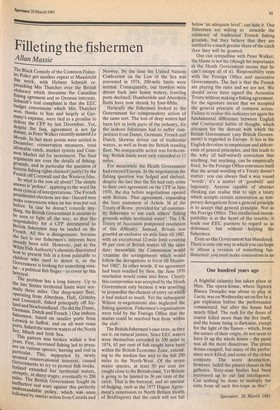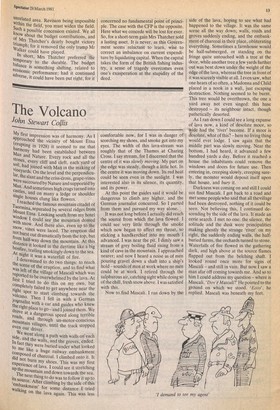Filleting the fishermen
Allan Masne
The Black Comedy of the Common Fisheries Policy got another repeat at Maastricht this week, with Helmut Schmidt reproaching Mrs Thatcher over the British Obduracy which threatens the Canadian fishing agrement and so German interests. Schmidt's real complaint is that the EEC budget concessions which Mrs Thatcher won, thanks to him and largely at Germany's expense, were tied to a proniise to deliver the CFP by last December. Yet, despite the fuss, agreement is not far distant, as Peter Walker recently assured Le Monde. In fact most points were settled in December: conservation measures, total allowable catch, market system and Common Market aid for investment. The final arguments are over the details of fishinggrounds, and in particular the question of historic fishing rights claimed (justly) by the French off Cornwall and the Western Isles. So what is the row all about? The simple answer is 'politics', applying to the word the rnost cynical of interpretations. The French presidential elections are due: Giscard may make concessions when he has won but not before. In case he doesn't concede anything, the British Government is anxious to be seen to fight all the way, so that the responsibility for a CFP detrimental to British fishermen may be landed on the French. All this is disingenuous, because the fact is our fishermen's interests have already been sold. However, just as the White Fish Authority's chemists discovered how to present fish in a form palatable to children who used to detest it, so the Government is looking for something similar — a political fish finger — to cover up this betrayal. The problem has a long history. Up to the late Sixties territorial limits were normally three miles. Our deep-water fleet, operating from Aberdeen, Hull, Grimsby and Lowestoft, fished principally off Iceland and Newfoundland. (So did the Danes, Germans, Dutch and French.) Our inshore fishermen, based on smaller ports from Lerwick to Suffok, and on all west coast Ports, fished the narrow waters of the North Sea, Minch and Irish Sea. This pattern was broken within a few years. First, increased fishing led to pressure on various species; herring and cod in particular. This, supported by newly aroused conservationist interests, caused Governments to try to protect fish stocks. Iceland extended her territorial waters, abruptly, in sharp stages, eventually to 200 miles. The British Government fought its ineffective cod wars against this perfectly understandable policy, which was soon followed by similar action from Canada and Norway. By the time the United Nations Conference on the Law of the Sea was convened in 1974, 200-mile limits were normal, Consequently, our trawlers were driven back into home waters; trawling ports declined; Humberside and Aberdeen fleets have now shrunk by four-fifths.
Naturally the fishermen looked to the Government for compensatory action of the same sort. The loss of deep waters had been felt in both parts of the industry, for the inshore fishermen had to suffer competition from Danes, Germans, French and Dutch, likewise driven out of traditional waters, as well as from the British trawling fleet. No comparable action was forthcoming; British limits were only extended to 12 miles.
For meanwhile the Heath Government had entered Europe. In the negotiations the fishing question was fudged and shelved, despite the fact that the Six had only come to their own agreement on the CFP in June 1970, the day before negotiations opened with Britain. That ,agreement, expanding the bare statement of Article 38 of the Treaty of Rome, provided for 'all community fishermen to use each others' fishing grounds within territorial water'. The UK Treaty of Accession postponed resolution of this difficulty. Instead, Britain was granted an exclusive six mile limit till 1982, with an exceptional 12-mile limit covering 95 per cent of British waters till the same date; meanwhile the Commission would 'examine the arrangements which would follow the derogations in force till December 1982'. In other words, if no agreement had been reached by then, the June 1970 resolution would come into force. Clearly this compromise was accepted by the Heath Government only because it was unwilling to jeopardise the chances of entry on which it had staked so much. Yet the subsequent Wilson re-negotiations also neglected the fishing question. Fishermen's organisations were told by the Foreign Office that the matter could be resolved best from 'within the club'.
The British fishermen's case rests, as they see it, on natural justice. Since EEC waters were themselves extended to 200 miles in 1974, 65 per cent of fish caught have been within the British Economic Zone, extending to the median line and to the full 2(X) miles to the North-West. Of the seven major species, at least 50 per cent are caught close to the British coast. Yet Britain is going to be limited to 36 per cent of the catch. That is the betrayal, and no amount of fudging, such as the 1977 Hague Agreement's concession to North Britain (north of Bridlington) that the catch will not fall below 'an adequate level', can tilde it. Our fishermen are willing to concede the existence of traditional French fishing grounds, but they believe that they are entitled to a much greater share of the catch than they will be granted.
One can sympathise with Peter Walker; the blame is not his (though his importance in the Heath Government means that he can't escape all of it). Responsibility rests with the Foreign Office and successive Governments. The fact is that the French are playing the rules and we are not. We should never have signed the Accession Treaty without making a fishing agreement, for the signature meant that we accepted the general principle of common access. Failure to realise this indicates yet again the fundamental difference between English and Continental habits of thought, which accounts for the distrust with which the British Government (any British Government) is regarded in Europe. It lies in the English devotion to empiricism and abhorrence of general principles, and this leads to the lofty (if half-witted) conviction that anything, but anything, can be empirically fixed. So the Foreign Office convinces itself that the actual wording of a Treaty doesn't matter: you can always find a way round 'words'; it's a matter of 'goodwill' and ingenuity. Anyone capable of abstract thinking can realise that to sign a treaty which accepts certain concessions as temporary derogations from a general principle is to accept that general principle. Not so the Foreign Office. This intellectual incompatibility is at the heart of the trouble; it leads our EEC partners to regard us as dishonest, but without helping the fishermen.
Even so this Government has blundered. There is only one way in which you can hope to obtain a revision of something fundamental: you must make concessions in an unrelated area. Revision being impossible Within the field, you must widen the field. Such a possible concession existed. We all know about the budget contributions, and of Mrs Thatcher's dearly bought victory triumph; for it removed the only trump Mr Walker could have played. In short, Mrs Thatcher preferred the temporary to the durable. The budget balance is something shifting, related to economic performance; had it continued adverse, it could have been put right, for it concerned no fundamental Point Of principle. The case with the CFP is the opposite. Here what we concede will be lost for ever. So, for a short-term gain Mrs Thatcher sold a lasting asset. It is never, as this Government seems reluctant to learn, wise to correct an imbalance on current expenditure by liquidating capital. When the capital takes the form of the British fishing industry, a sense of tragedy overcomes even one's exasperation at the stupidity of the deed.











































 Previous page
Previous page